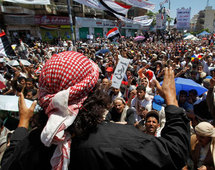
In a lengthy report, the group said 13 billion euros given or planned by the 27-state European Union to countries in the Middle East and north Africa between 1995 and 2013 had failed to promote democracy and development in the region.
It added that the annual trade deficit of Mediterranean nations with the EU soared from 530 million euros (758 million dollars) in 2006 to 20.4 billion euros in 2010.
"Moving forward, Europe must establish a far stronger link between reforms on the ground and funding, with particular focus on boosting trade in the region," said the report by the pro-economic liberalisation body set up by English business leaders.
The findings were released as EU foreign affairs chief Catherine Ashton and neighbourhood commissioner Stefan Fuele put the finishing touches on a policy overhaul ordered by heads of state and government during spring summits.
"On numerous occasions since the beginning of the year," Fuele's spokeswoman Natasha Butler stressed, the EU has "emphasized the need to draw lessons from the past, rise up to the challenges faced in our neighbourhood and in particular address the consequences of the Arab Spring".
She lambasted the criticism as "erroneous and simplistic", underlining that the EU "recognized already in February that it could have exercised more pressure on authoritarian regimes" on its Arab north African rim, and that "certain mistakes were made in the past".
Butler took particular issue with criticism of negotiations launched in 2008 with Libya aimed at wide-ranging political and economic ties she said also included "governance and human rights".
The negotiations with Moamer Kadhafi's regime "were far from being concluded when they were suspended in February", she insisted, adding that "most of the 60 million euros channelled over three years was not destined for the government".
Brussels proposed in March to more closely link aid to democratic reforms, but not all EU states agreed on the severity of the conditions to be attached on the funds, with one diplomat saying southern Europeans wanted looser demands.
Butler maintained that the EU's forthcoming European Neighbourhood Policy Review "will address the shortcomings identified" by the EU itself, as well as external observers.
Open Europe said the EU should threaten to suspend aid to Mediterranean neighbours that fail to implement true reforms, called for the completion of a single European-Mediterranean free trade area, and demanded leaders scrap a little-known Union for the Mediterranean and the 6.2 million euros earmarked this year for its running costs in Barcelona.
Championed by France, the Union for the Mediterranean has stalled due to the Israeli-Palestinian conflict.
----------------------------------------------------------------------------------
It added that the annual trade deficit of Mediterranean nations with the EU soared from 530 million euros (758 million dollars) in 2006 to 20.4 billion euros in 2010.
"Moving forward, Europe must establish a far stronger link between reforms on the ground and funding, with particular focus on boosting trade in the region," said the report by the pro-economic liberalisation body set up by English business leaders.
The findings were released as EU foreign affairs chief Catherine Ashton and neighbourhood commissioner Stefan Fuele put the finishing touches on a policy overhaul ordered by heads of state and government during spring summits.
"On numerous occasions since the beginning of the year," Fuele's spokeswoman Natasha Butler stressed, the EU has "emphasized the need to draw lessons from the past, rise up to the challenges faced in our neighbourhood and in particular address the consequences of the Arab Spring".
She lambasted the criticism as "erroneous and simplistic", underlining that the EU "recognized already in February that it could have exercised more pressure on authoritarian regimes" on its Arab north African rim, and that "certain mistakes were made in the past".
Butler took particular issue with criticism of negotiations launched in 2008 with Libya aimed at wide-ranging political and economic ties she said also included "governance and human rights".
The negotiations with Moamer Kadhafi's regime "were far from being concluded when they were suspended in February", she insisted, adding that "most of the 60 million euros channelled over three years was not destined for the government".
Brussels proposed in March to more closely link aid to democratic reforms, but not all EU states agreed on the severity of the conditions to be attached on the funds, with one diplomat saying southern Europeans wanted looser demands.
Butler maintained that the EU's forthcoming European Neighbourhood Policy Review "will address the shortcomings identified" by the EU itself, as well as external observers.
Open Europe said the EU should threaten to suspend aid to Mediterranean neighbours that fail to implement true reforms, called for the completion of a single European-Mediterranean free trade area, and demanded leaders scrap a little-known Union for the Mediterranean and the 6.2 million euros earmarked this year for its running costs in Barcelona.
Championed by France, the Union for the Mediterranean has stalled due to the Israeli-Palestinian conflict.
----------------------------------------------------------------------------------









 Home
Home Politics
Politics









